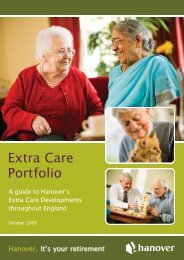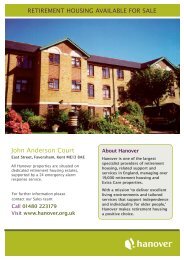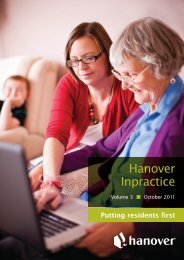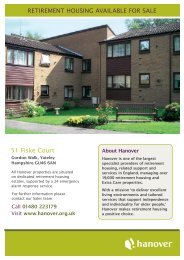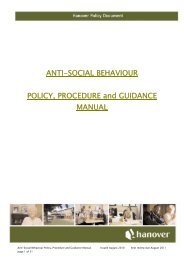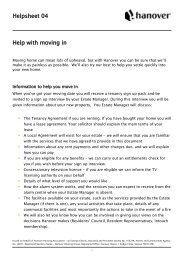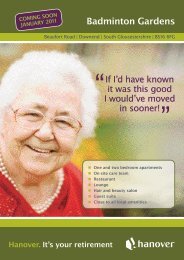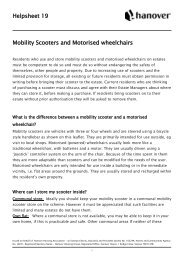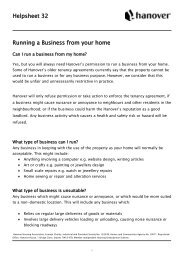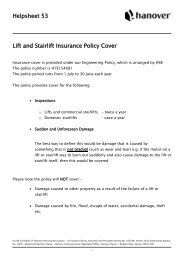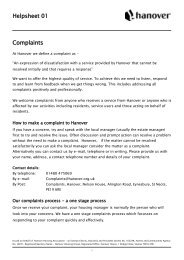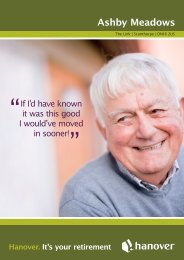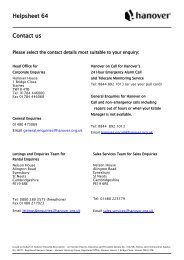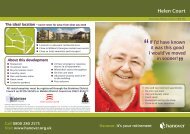20 Years of Extra Care: A Review - Hanover
20 Years of Extra Care: A Review - Hanover
20 Years of Extra Care: A Review - Hanover
You also want an ePaper? Increase the reach of your titles
YUMPU automatically turns print PDFs into web optimized ePapers that Google loves.
• Housing with care provided better value<br />
for money than residential care<br />
• Security was a prime concern for all<br />
– including knowing help was on hand<br />
when needed<br />
• Quality and size <strong>of</strong> accommodation were<br />
key contributors in deciding to apply<br />
• Residents repeatedly referred to the<br />
independence and security developments<br />
<strong>of</strong>fered, yet also being part <strong>of</strong> a community<br />
These findings are mirrored in <strong>Hanover</strong>’s<br />
experience <strong>of</strong> what older people are looking for<br />
in <strong>Extra</strong> <strong>Care</strong> housing.<br />
3.1.1 Independence and choice<br />
In response, <strong>Hanover</strong>’s model <strong>of</strong> <strong>Extra</strong> <strong>Care</strong><br />
housing was developed to empower older<br />
people in making choices that are important to<br />
them. A concrete example is the introduction<br />
<strong>of</strong> ‘their own front door’ and having 'tenure<br />
certainty' that meant older people in receipt <strong>of</strong><br />
care could refuse access to their home to anyone<br />
they did not want to see – a revolution in the<br />
care and support <strong>of</strong> frail older people, who have<br />
no such powers in a residential care setting.<br />
3.1.2 Flexible services and<br />
living environments<br />
Older people want services that allow them to<br />
retain control over their daily lives with support<br />
delivered as and when they need it. Services<br />
need to be highly flexible in their delivery,<br />
capable <strong>of</strong> being easily reproduced in their<br />
essentials, but speedily adapted to suit ever<br />
changing needs.<br />
Ordinary housing is <strong>of</strong>ten not capable <strong>of</strong><br />
responding to even minor disabilities.<br />
Retirement housing developments usually take<br />
some account <strong>of</strong> the disabilities residents may<br />
experience, but much <strong>of</strong> the older stock fails<br />
to provide sufficiently flexible or adaptable<br />
environments for people with more severe<br />
disabilities. Flexible living environments is a<br />
key component in the design <strong>of</strong> <strong>Hanover</strong>’s <strong>Extra</strong><br />
<strong>Care</strong> housing, so no matter what level <strong>of</strong> fitness<br />
or ability, the design should be capable <strong>of</strong><br />
adaptation to changing needs.<br />
Lifestyles are highly individual; what one<br />
person considers a decent degree <strong>of</strong> privacy<br />
may feel to someone else like intolerable<br />
loneliness. Packages <strong>of</strong> care and support<br />
therefore need to be flexible and services<br />
tailored to individuals. <strong>Hanover</strong> is seeking<br />
to move from the approaches that have<br />
been applied in previous ‘generations’ <strong>of</strong><br />
retirement housing, where services have been<br />
standardised by pr<strong>of</strong>essionals, to an approach<br />
where <strong>Hanover</strong> will be guided by local choices<br />
and wishes <strong>of</strong> residents. The ethos adopted is<br />
based on treating older people as the adults<br />
they are and not assuming that pr<strong>of</strong>essionals<br />
know what they want.<br />
3 Older people, local communities and partnerships<br />
10




